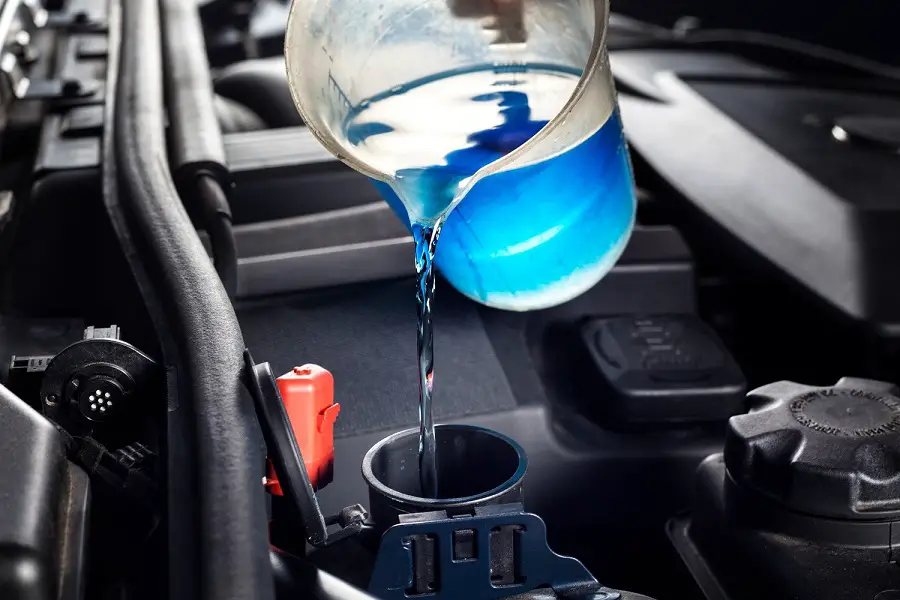When it comes to enjoying the great outdoors, antifreeze is a must-have for any RV or camping trip.
Whether you’re taking your vehicle on an extended road trip in colder climates, doing some winter fishing and hunting, or just making sure your car is running properly year round – antifreeze plays an important role in keeping things running smoothly.
But what exactly is antifreeze? How do you use it correctly?
What are common problems associated with using this product?
And how can you store and dispose of it safely without endangering yourself or the environment around us?
We’ll answer all these questions plus provide tips on alternatives to traditional automotive antifreeze solutions so that you can make informed decisions when embarking on your next adventure!
What is Antifreeze?
Antifreeze is a liquid that helps keep the engine of a vehicle from freezing in cold weather. It also raises the boiling point of water, allowing it to circulate through an engine’s cooling system and prevent overheating.
Antifreeze is typically made up of ethylene glycol or propylene glycol mixed with water and other additives for corrosion protection.
Definition of Antifreeze
Antifreeze is a fluid used in automobiles to help maintain optimal temperatures within the engine’s cooling system during extreme temperature changes, such as hot summer days or cold winter nights.
It does this by raising the boiling point of water so that it can remain in liquid form at higher temperatures and lowering its freezing point so that it won’t freeze when exposed to colder temperatures.
Types of Antifreeze
There are two main types of antifreezes – traditional green antifreezes which are usually composed primarily of ethylene glycol, and newer extended-life coolants which use propylene glycol instead.
Additionally, there are speciality coolants available for specific applications such as racing vehicles or off-roaders where additional protection against corrosion may be needed.
How to Use Antifreeze
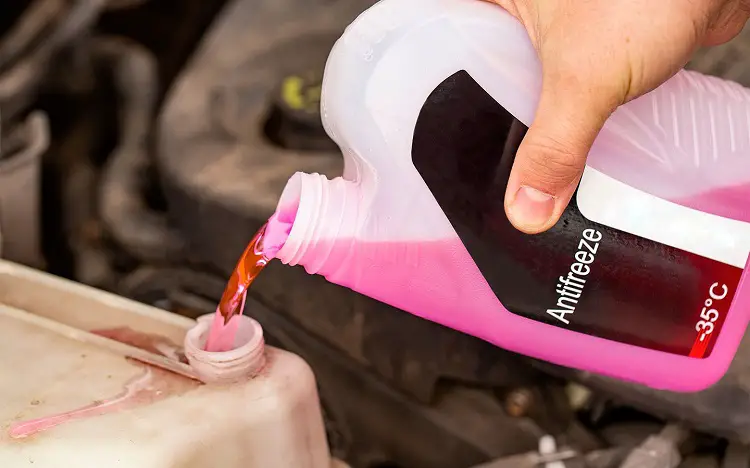
Antifreeze is a vital component of any vehicle, as it helps to keep the engine cool and prevents corrosion.
Preparing your vehicle for antifreeze application is essential in order to ensure that the right amount of antifreeze is added. To do this, you should first check your owner’s manual or consult with an expert mechanic to determine what type of antifreeze is best suited for your vehicle.
Once you have determined the correct type, make sure that all other fluids such as oil and transmission fluid are at their proper levels before adding antifreeze.
Adding the right amount of antifreeze can be tricky since too much or too little can cause serious damage to your engine. It’s important to use a measuring device like a funnel or syringe when pouring in the liquid so that you don’t overfill it.
Additionally, if there are any leaks present in your cooling system then they must be fixed prior to adding new antifreeze otherwise it won’t work properly and could even lead to further damage down the line.
If ever unsure about anything related to using antifreezes, please contact an experienced mechanic who will provide professional advice tailored specifically towards keeping both yourself and car safe.
Common Problems with Antifreeze
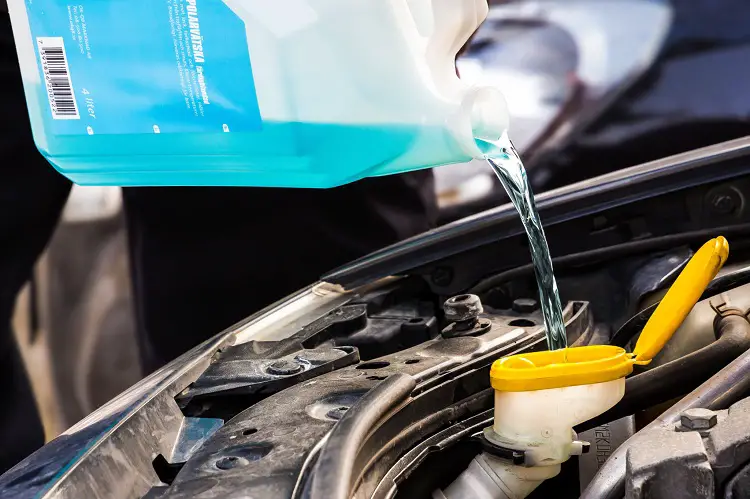
It also helps protect the vehicle’s cooling system components from corrosion and rusting.
Unfortunately, there are some common problems associated with antifreeze that can cause damage to your car if not addressed quickly.
Leaking and Overheating Issues
One of the most common issues with antifreeze is leaking or overheating due to a faulty radiator cap or thermostat.
If left unchecked, this can lead to serious engine damage as well as costly repairs. To avoid these problems, it’s important to check your vehicle regularly for any signs of leakage or overheating and replace any worn out parts immediately.
Corrosion and Rusting Issues
Another issue related to antifreeze is corrosion caused by water mixing with the chemicals in the coolant solution over time.
This can result in rust forming on various metal components inside your engine such as valves, pistons, cylinders, etc., which will eventually reduce their efficiency and performance levels significantly if not treated properly.
To prevent this problem from occurring, make sure you use only high-quality antifreezes that are designed specifically for your vehicle type and model year when topping up fluids in your car’s cooling system periodically.
Tips for Storing and Disposing of Antifreeze Properly
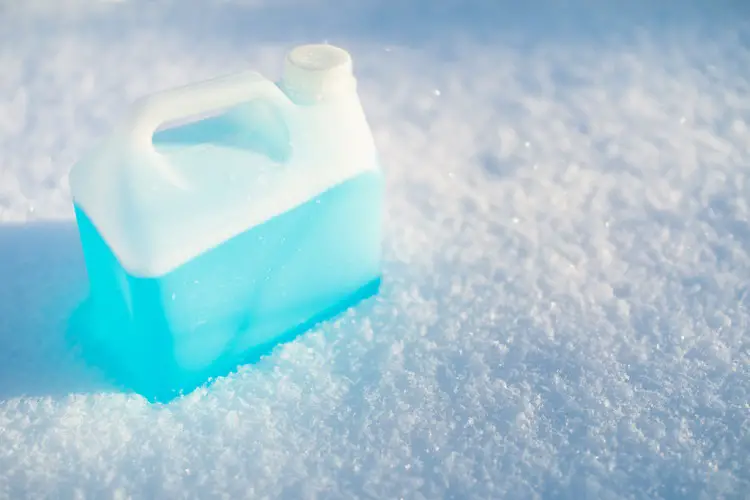
Storing and Handling Guidelines for Different Types of Antifreezes
When storing antifreeze, it is important to keep the container sealed and away from direct sunlight. This will help ensure that the antifreeze does not become contaminated or evaporate.
It is also important to make sure that you are using the correct type of antifreeze for your vehicle. Different types of vehicles require different types of antifreeze, so be sure to check with your manufacturer before purchasing any product.
Disposal Methods for Used or Unwanted Antifreezes
If you have used or unwanted antifreeze, there are several disposal methods available depending on where you live.
Many local automotive shops offer a recycling program in which they will take used antifreeses and dispose of them properly according to environmental regulations.
You can also contact your local waste management department as many cities have programs specifically designed for disposing hazardous materials such as anti-freezes safely and legally.
Whenever possible, try to avoid dumping unused or unwanted anti-freezes into sewers, storm drains, lakes, rivers or other bodies of water as this can cause serious damage to aquatic life and ecosystems due to its toxicity levels.
Additionally, when disposing of used anti-freezes it is important to wear protective gear such as gloves and safety glasses in order protect yourself from potential harm caused by accidental exposure while handling these products responsibly.
Alternatives to Traditional Automotive Anti Freeze Solutions
Organic coolants are a great alternative to traditional automotive anti freeze solutions. These coolants are made from organic compounds such as vegetable oils, glycerin, and propylene glycol.
They provide excellent protection against corrosion and rusting while also being biodegradable and non-toxic. Organic coolants are often used in cars that require frequent oil changes or for those who prefer a more eco-friendly option.
Examples of organic coolant brands include Valvoline’s EcoPower Coolant and Royal Purple’s MaxCool Organic Coolant.
Synthetic coolants offer superior performance compared to traditional antifreeze solutions due to their high boiling points, low freezing points, and improved heat transfer capabilities.
Synthetic coolants can be formulated with different additives depending on the application needed for your vehicle. Some examples of synthetic antifreeze brands include Prestone’s Dexcool Antifreeze/Coolant and Peak Long Life Antifreeze & Coolant Concentrate 50/50 Pre-Diluted Formula.
Waterless coolants are another great alternative to traditional automotive anti freeze solutions as they do not contain any water, thus eliminating the risk of freezing or boiling over during extreme temperatures or engine loads respectively.
Waterless cooling systems use special lubricating oils instead of water which provides better lubrication between moving parts in an engine than conventional antifreezes do while still providing adequate cooling performance when necessary.
Examples of waterless antifreeze brands include Red Line Water Wetter Supercooler Concentrate and Evans High Performance Waterless Engine Coolant System Kit 100%.
FAQs
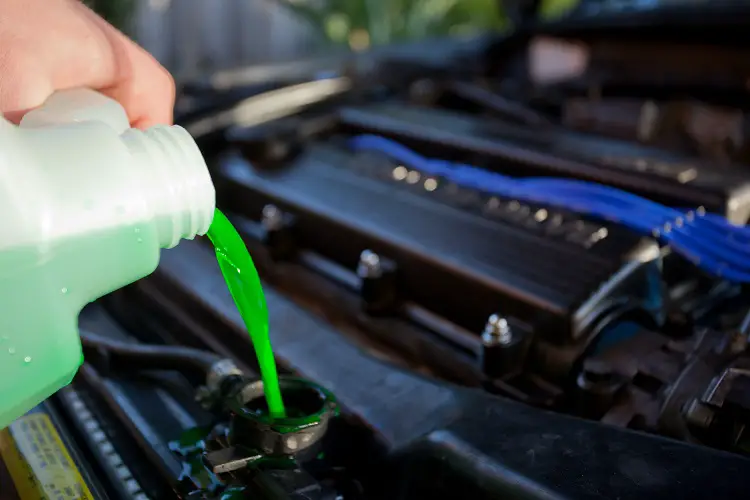
What is antifreeze used for?
Antifreeze is a liquid solution that helps to prevent water from freezing in cold temperatures.
It is used in many outdoor activities such as RVing, camping, fishing, hunting and survival. Antifreeze lowers the freezing point of water so it can remain liquid even at very low temperatures.
This allows engines and other machinery to operate safely during cold weather conditions. Additionally, antifreeze prevents corrosion and rusting inside radiators or cooling systems by providing lubrication for moving parts.
Finally, antifreeze also acts as an additive which increases the boiling point of liquids so they don’t overheat when exposed to high temperatures.
Do I need antifreeze for my car?
Yes, antifreeze is necessary for your car. It helps keep the engine cool and prevents it from freezing in cold temperatures. Antifreeze also increases the boiling point of water to prevent overheating, which can cause damage to your vehicle’s engine.
Make sure you use a quality antifreeze that meets or exceeds manufacturer specifications for your make and model of car. Check with an auto parts store or mechanic if you’re unsure what type of antifreeze is best for your vehicle.
CAN ANTIFREEZE FIX MY AC?
No, antifreeze cannot fix your air conditioning (AC). Antifreeze is a liquid that helps prevent the engine from freezing in cold temperatures.
It does not have any effect on AC systems and should never be used as a substitute for refrigerant or other parts of an AC system. If you are having issues with your AC, it is best to consult a professional technician who can diagnose and repair the issue properly.
What is antifreeze chemically?
Antifreeze is a chemical compound typically made up of ethylene glycol or propylene glycol. It helps to reduce the freezing point and increase the boiling point of water, which prevents engine coolant from freezing in cold temperatures and overheating in hot climates.
Antifreeze also contains corrosion inhibitors that help protect metal parts from rusting or corroding. The use of antifreeze ensures engines are able to function properly even when exposed to extreme temperatures.
Conclusion
Antifreeze is an important part of any outdoor adventure, whether you are camping in your RV or out on a fishing trip. It’s important to understand how to use it properly and safely, as well as knowing the common problems that can arise when using antifreeze.
With proper storage and disposal techniques, you can ensure that your antifreeze will be safe for both yourself and the environment. If traditional automotive anti freeze solutions don’t work for you, there are plenty of alternatives available to choose from.
No matter what type of outdoor activity you plan on embarking on, having a good understanding of antifreeze will help make sure your experience is enjoyable and safe!
Resources:


